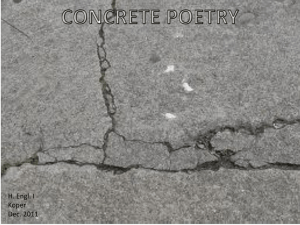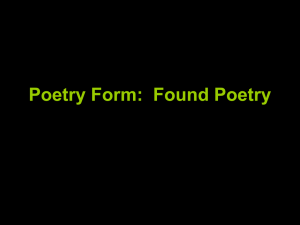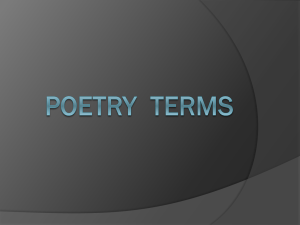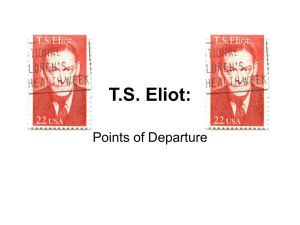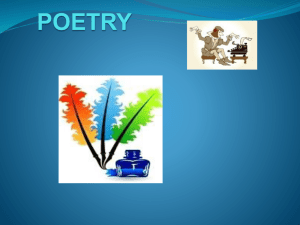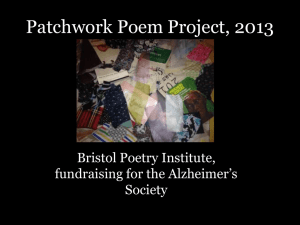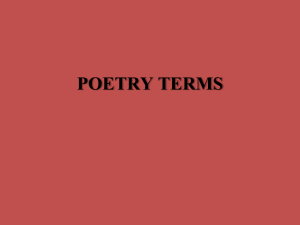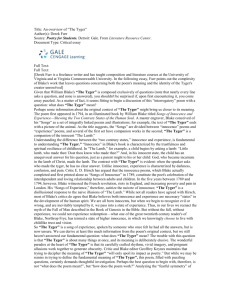Poetry and Communication
advertisement
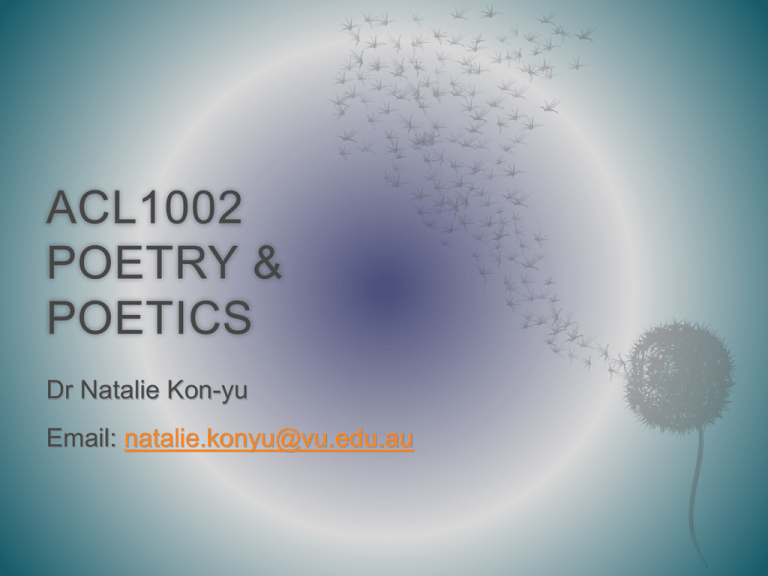
ACL1002 POETRY & POETICS Dr Natalie Kon-yu Email: natalie.konyu@vu.edu.au Lecture 4: ‘Poetry and Communication’ 1. 2. What does poetry communicate? • E.g. Communicating things or facts. • E.g. Communicating ideas or notions. • E.g. Communicating feelings or experiences. • E.g. Communicating what cannot be categorised. At what ‘levels’ does poetry communicate its meanings (or meaningless-es)? Does poetry communicate? This apparently innocent and simple question is one bound to cause controversy among poetry circles and beyond. 50 years ago William J Rooney said: “In the last seventy-five years the problem of poetry and communication has been the most insistent theme of most criticism. The flow of opinion . . . has emphasized . . . the noncommunicative aspects of poetry The gradual emergence out of the late-Nineteenth into the Twentieth century of a deliberate, self-conscious emphasis on the literary product as somehow autonomous.” Rooney’s position is still fairly dominant, and contemporary poetry editors of most literary magazines in Australia would hold a position similar to this one. We can explore this question further by looking at a poem by the English Romantic poet John Keats. His 'Ode on a Grecian Urn' is one of the centrally important poems for a number of critics. It embodies the kind of poetic values that they were trying to elevate. Keats’ ‘Ode on a Grecian Urn’ http://www.eecs.harvard.edu/~keith/poems/urn .html What ideas are being explored in this poem? Is this poem realistic? What do you think motivates Keats to say (write) these lines? Does he expect a particular response from us as readers? Communicating Keats’ Ode Keats' poem can be read as expressing an aesthetic that keeps the literary object apart from context, influence and indeed communication. There are of course other opinions – that poetry is primarily about communication between people and that without communication it fails as an art form. Cleanth Brooks writes ‘I think our initial question, 'What does the poem communicate?' is badly asked. It is not that the poem communicates nothing. Precisely the contrary. The poem communicates so much and communicates it so richly and with such delicate qualifications that the thing communicated is mauled and distorted if we attempt to convey it by any vehicle less subtle that that of the poem itself.’(pp. 72-73) Communicating feeling/experience: TS Eliot felt that "Genuine poetry can communicate before it is understood." Whereas other ways of thinking might suggest that something needs to be understood before it communicates. We’ll take an example from Icelandic pop group Sigur Ros http://www.youtube.com/watch?v=HiOU9NAiYlQ What is the song about? Can we tell anything about the meaning from the sound? What is the tone, mood or feeling we get from the music and the sound of the lyrics? A silver river illuminates the whole world and blue eyes Cut the starry sky I make a wish and close your eyes now Yes, do that, may it now come true Oh no At the speed of the stars Inside my heart explodes, an airplane rumbles Cracked open the earth sings I make a wish and close your eyes now Yes, do that, let's go dance Everything is forgotten in bliss, and may it come true I open my eyes Oh no My best friend whatever may happen I swallow a tear and breathe in your hair Making a ruckus, we cry in each other's arms When we meet When we kiss Lips burning, holding hands I see you waking up I see you naked Within me a lunatic sings Always you wade, we run faster Everything becomes smaller, I scream louder Am about to wade, going away How does Poetry communicate? Poetry communicates substance through form via – Rhythm Sound Words Meaning William Blake’s ‘The Tyger’ What is the poem about? Where has Blake’s Tyger been created? Is there a religious aspect to this poem? How do we know that? Is Blake commenting on the ability of poetry to describe the Tyger? If so, what is he saying about it? Aunt Jennifer’s Tigers Aunt Jennifer's tigers prance across a screen, Bright topaz denizens of a world of green. They do not fear the men beneath the tree; They pace in sleek chivalric certainty. Aunt Jennifer's fingers fluttering through her wool Find even the ivory needle hard to pull. The massive weight of Uncle's wedding band Sits heavily upon Aunt Jennifer's hand. When Aunt is dead, her terrified hands will lie Still ringed with ordeals she was mastered by. The tigers in the panel that she made Will go on prancing, proud and unafraid. Communicating things or facts: ‘Aunt Jennifer’s Tigers’ What are the central facts at issue in this poem? Are they particularly well suited to poetic expression? (Why or why not?) How does the form of the poem amplify its meaning? Inter-textual Communication: Rich’s Tigers and Blake’s Tyger Do these two poems relate to one another? How does our understanding of Blake’s Tyger effect how we read Rich’s tigers? What other factors can contribute to a reading of this poem? Is there a gendered reading to be made of Rich’s poem? Sylvia Plath http://www.youtube.com/watch?v=6hHjctqSBwM

